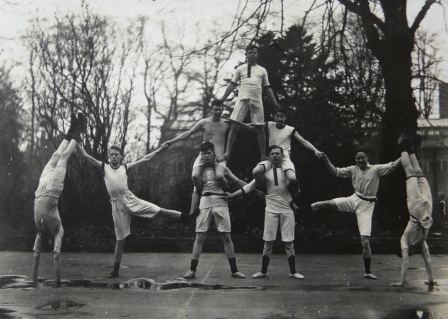
In the First World War, many thousands of Belgian refugees came to Britain and relief committees were established to help them. Quakers in York played an important role; several families were housed at the garden village of New Earswick, founded by the York philanthropist Joseph Rowntree, and money was raised both to support them and towards Belgian Relief Funds. It has already been mentioned in earlier blog posts that Bootham school supported a Belgian refugee family See previous posts from September 1914 and January 1915.
By Spring 1916, Bootham School was involved in further fundraising for Belgian relief. From the Annual Report:
“For many weeks the School worked hard in preparation for the Belgian Bazaar. Things were made in the workshop, knitting became popular, voluntary gymnastic classes were held, dramatic scenes were rehearsed, and friends all over the country were importuned to contribute goods and money. ”
The report for Spring Term Jan and Feb 1916, in Bootham magazine tells us:
“THE exceedingly mild weather of January and the prospects of some novel excitement in the shape of a Zeppelin raid have served to reconcile us to some extent to the deficiencies of the average Spring Term, and the work that we are doing in preparation for the great Belgian show has not allowed much time to hang idly on our hands. The knitting operations, in fact, and the generally busy atmosphere of the workshop and other such places, are a constant reminder to us of the determined way in which everybody is setting to work to make this event an unprecedented success.”
The event was a huge success. Bootham magazine reported afterwards:
“On the 25th (March) our great event took place, when the major part of the leisure-hour work of the term found its culmination in the long-awaited Belgian Bazaar. We anticipated an unprecedented success, but even more, if such is possible, was the case. Practically speaking, there was nothing left on the stalls; everyone was at his best, and not a hitch occurred throughout. From the stall-keepers dispensing of their wares to the extra singing-class masquerading as a “wall” all played their parts nobly, and the results exceeded our most sanguine hopes. A sum of well over sixty pounds was realised and has been divided, at the discretion of the Finance Committee, amongst the several Belgian Relief Funds in which we are interested.”
